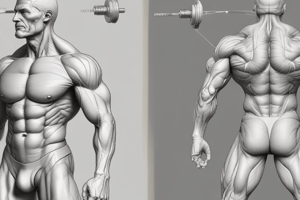Podcast
Questions and Answers
What is the recommended daily intake of carbohydrates for a person who weighs 70 kilograms?
What is the recommended daily intake of carbohydrates for a person who weighs 70 kilograms?
- 140-210 grams (correct)
- 120-150 grams
- 160-200 grams
- 100-140 grams
How often should you eat to support your fitness goals?
How often should you eat to support your fitness goals?
- 2 meals per day, spaced out every 5-6 hours
- 3 meals per day, spaced out every 4-5 hours
- 5-6 meals per day, spaced out every 2-3 hours (correct)
- 4 meals per day, spaced out every 3-4 hours
What is the recommended amount of water to drink 2-3 hours before exercise?
What is the recommended amount of water to drink 2-3 hours before exercise?
- 20-25 ounces
- 8-10 ounces
- 10-12 ounces
- 17-20 ounces (correct)
How many hours of sleep is recommended per night to support fitness goals?
How many hours of sleep is recommended per night to support fitness goals?
What is a recommended stress management technique?
What is a recommended stress management technique?
What is an important aspect of mental preparation for fitness?
What is an important aspect of mental preparation for fitness?
Flashcards are hidden until you start studying
Study Notes
Nutrition for Fitness
- Macronutrients:
- Carbohydrates: provide energy for workouts, 2-3 grams per kilogram of body weight daily
- Protein: builds and repairs muscle tissue, 1.2-1.6 grams per kilogram of body weight daily
- Fat: provides energy and supports hormone production, 0.5-1 gram per kilogram of body weight daily
- Meal Frequency and Timing:
- Eat 5-6 meals per day, spaced out every 2-3 hours
- Post-workout meal: consume carbohydrates and protein within 30-60 minutes after exercise
- Hydration:
- Drink at least 8-10 glasses of water per day
- Aim to drink 17-20 ounces of water 2-3 hours before exercise
Wellness for Fitness
- Sleep and Recovery:
- Aim for 7-9 hours of sleep per night
- Allow for 1-2 rest days per week for recovery
- Stress Management:
- Engage in stress-reducing activities, such as yoga or meditation, 2-3 times per week
- Prioritize time management and goal setting to reduce stress
- Mental Preparation:
- Set specific, achievable, and measurable fitness goals
- Focus on positive self-talk and visualization to boost confidence and motivation
Nutrition for Fitness
- Carbohydrate Intake:
- Daily requirement: 2-3 grams per kilogram of body weight
- Provides energy for workouts
- Protein Intake:
- Daily requirement: 1.2-1.6 grams per kilogram of body weight
- Builds and repairs muscle tissue
- Fat Intake:
- Daily requirement: 0.5-1 gram per kilogram of body weight
- Provides energy and supports hormone production
- Meal Frequency:
- Eat 5-6 meals per day
- Space out meals every 2-3 hours
- Post-Workout Nutrition:
- Consume carbohydrates and protein within 30-60 minutes after exercise
- Enhances muscle recovery and growth
Hydration
- Daily Water Intake:
- Drink at least 8-10 glasses of water per day
- Essential for overall health and fitness
- Pre-Workout Hydration:
- Drink 17-20 ounces of water 2-3 hours before exercise
- Prepares body for physical activity
Wellness for Fitness
- Sleep and Recovery:
- Aim for 7-9 hours of sleep per night
- Essential for physical recovery and muscle growth
- Rest Days:
- Allow for 1-2 rest days per week
- Enables body to recover and rebuild
- Stress Management:
- Engage in stress-reducing activities 2-3 times per week
- Prioritize time management and goal setting
- Mental Preparation:
- Set specific, achievable, and measurable fitness goals
- Focus on positive self-talk and visualization for motivation and confidence
Studying That Suits You
Use AI to generate personalized quizzes and flashcards to suit your learning preferences.



